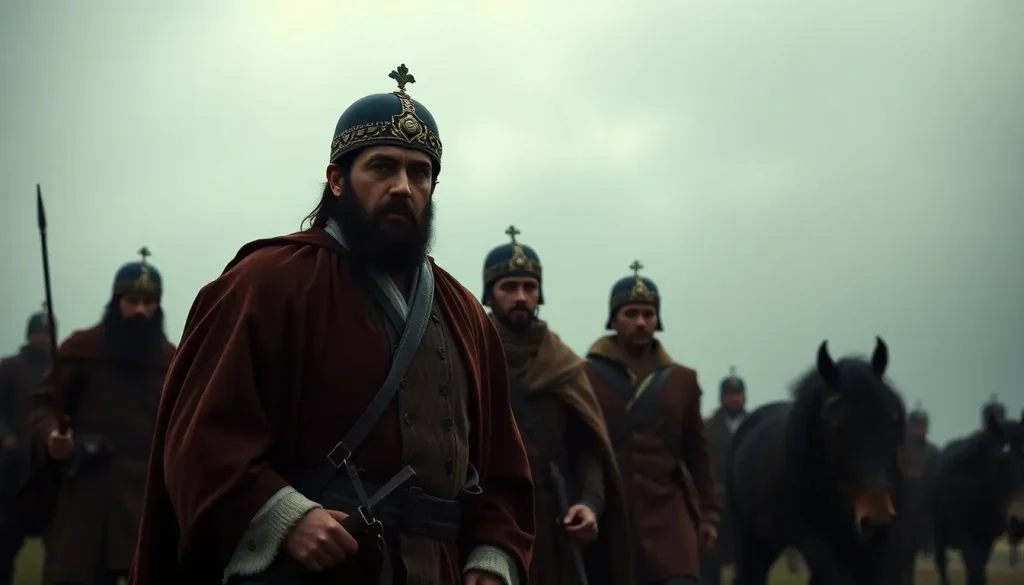5 controversial historical films like Alejandro Amenábar's The Captive

El Cautivo, the latest film by Alejandro Amenábar, has stirred controversy even before its release. The film's premise explores a crucial aspect of Spain's cultural heritage: the life of Miguel de Cervantes, portrayed by Julio Peña. However, rather than focusing on Cervantes' literary achievements or his heroic role in the Battle of Lepanto, the film takes a bold direction. Its narrative reimagines a dark chapter in the famous author's biography: his captivity in Algiers. The plot suggests that Cervantes may have seduced the Algiers beylerbey, Hasán Bajá (played by Alessandro Borghi), using his imagination and talent.
This portrayal has raised eyebrows, igniting debates not just about the film's accuracy, but also about its historical interpretation. Critics have pointed out the lack of historical evidence supporting such a romantic relationship. Amenábar responded by clarifying that he aimed to reflect a queer reinterpretation of Cervantes, resonant with discussions prevalent since the 1980s. This controversy has reignited discussions about the expectations of historical accuracy in film, especially in an era characterized by constant reevaluations of historical narratives and figures of significant importance.
This isn't the first cinematic portrayal to spark discussions about historical fidelity. In fact, historical fiction often prioritizes entertainment over precise detail, leading to significant deviations from actual events. To illustrate this phenomenon, let’s explore five films that, much like El Cautivo, have ignited historical debates, ranging from classic dramas to animated tales set against turbulent backdrops.
Corazón valiente and its historical inaccuracies
The 1995 film Corazón Valiente, directed by Mel Gibson, is an iconic historical drama. However, it is also a prime example of significant inaccuracies regarding the events it depicts. The screenplay is based on a book titled Wallace by Harry, written over a century after the death of the Scottish hero William Wallace, resulting in a narrative filled with inaccuracies and a clear intention to liken Wallace's story to that of Jesus Christ in a rather exaggerated manner.
Interestingly, during Wallace's time, only Robert Bruce was known by the title Corazón Valiente. This title became so intertwined with Bruce’s memory that his friend James Douglas carried Bruce's heart on a crusade after his death. Therefore, the association of the name with Wallace is fundamentally flawed.
- The Battle of Stirling Bridge, a pivotal event in Wallace's fight for Scottish independence, omits the presence of Andrew Moray, another key leader.
- Wallace’s noble lineage is exaggerated; he was not of noble birth, yet the film depicts him as such.
- For dramatic effect, the film introduces fabricated characters and relationships, distorting historical truths.
The fabricated romance
One of the most criticized aspects of the film is the portrayal of a romantic relationship between William Wallace and Queen Isabella of France, played by Sophie Marceau. The film suggests that this relationship leads to a scandalous pregnancy before Wallace's death, a narrative thread completely unsupported by historical evidence.
Pearl Harbor: A dramatized retelling
In 2001, director Michael Bay attempted to recount the infamous events of the Pearl Harbor attack through an epic and overly dramatized lens, stretching over three hours. However, this film is notorious for its historical inaccuracies, straying far from the documented events—already tragic—by amplifying them to sensational levels.
From depicting Japanese aircraft attacking civilian targets to including anachronistic elements like E-2 Hawkeye planes decades before their actual development, the film is riddled with inaccuracies. Michael Bay himself acknowledged during the promotional campaign that he intentionally fabricated certain elements, like the attack on hospitals, to heighten the drama, drawing widespread criticism for trivializing a genuine historical tragedy.
- The portrayal of events in Pearl Harbor lacked respect for the actual suffering experienced.
- Critics have labeled Pearl Harbor as one of the worst historical films of the 21st century.
- The dramatic liberties taken overshadowed the true heroism displayed during the attack.
JFK: Caso abierto and conspiracy theories
Oliver Stone's 1991 film JFK: Caso abierto is regarded as a significant historical misrepresentation by many experts. The film incorporates a plethora of conspiracy theories surrounding the assassination of President John F. Kennedy, presenting them as facts. It utilizes original archival footage and public transcripts to lend an air of authenticity, but ultimately distorts the truth.
The film blends real events with speculation and outright falsehoods, including a pivotal scene where a character confesses to a convoluted conspiracy theory to assassinate Kennedy—a confession that never actually occurred in reality. Critics argue that while the film may provide a thought-provoking political commentary, it fails as a historical drama.
- The film's narrative is based on unproven theories rather than established facts.
- Key figures involved in the assassination were inaccurately portrayed, misleading audiences.
- Despite its ambition, the film sacrifices historical integrity for dramatic effect.
Gladiator: A flawed epic
Gladiator, directed by Ridley Scott, revitalized the historical epic genre but did so with numerous historical inaccuracies. The portrayal of Emperor Marcus Aurelius as a proponent of returning to the republic is a significant departure from historical reality; in truth, he never opposed the existing imperial structure.
Moreover, the film introduces various characters and plot points that didn't exist, such as a valiant general who becomes a gladiator. The inaccuracies extend to the visual elements, with anachronistic costumes and architectural styles that muddle the historical context.
- The film presents a romanticized view of ancient Rome, neglecting the complexities of its political landscape.
- Key historical figures are depicted inaccurately, distorting their real-life contributions.
- Despite its entertainment value, the film fails to deliver an accurate representation of its subject matter.
Pocahontas: A simplified narrative
Disney's 1995 animated feature Pocahontas introduces a tragic love story while attempting to pay homage to Indigenous culture. However, it simplifies a complex and often brutal reality. Pocahontas, born Amonute, was only around 10 or 11 years old when she encountered Captain John Smith, who was 27, making a romantic relationship improbable.
Historical evidence suggests that Pocahontas acted as an interpreter between the colonists and her father, Wahunsenaca (Chief Powhatan), rather than engaging in the romanticized narrative portrayed in the film. When Smith returned to Virginia after being injured, Pocahontas had already married another man, and their eventual reunion lacked any romantic undertones.
- The film misrepresents the age and roles of Pocahontas and Smith in their historical context.
- It glosses over the difficult realities faced by Indigenous peoples during colonization.
- While aiming to honor Native American culture, the film ultimately presents a Westernized view of history.
For those interested in exploring these cinematic interpretations further, you may find this video critique of El Cautivo insightful.




Leave a Reply